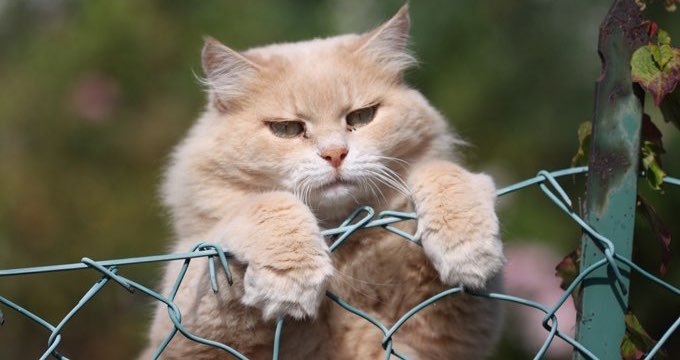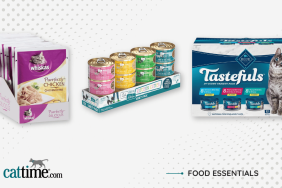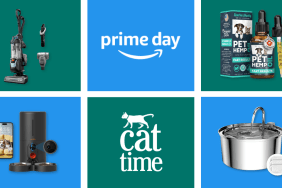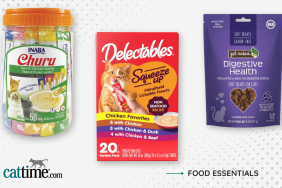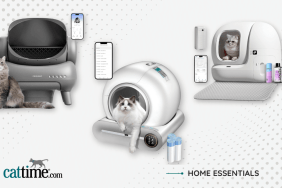Have you ever had a chubby cat who needed to lose a few pounds?
Being overweight can be detrimental to a cat’s health. However, just like crash dieting is a bad idea for people, it’s a really bad idea for cats. In fact, trying to get your cat to lose weight too fast could actually kill them!
If you suspect your cat is overweight, you must consult your vet and rely on their advice to help your cat shed the pounds in the right way. Here are a few tips on how to help your cat safely lose weight that you should discuss with your vet.
It’s Dangerous For Chubby Cats To Lose Weight Too Quickly
If your cat loses weight too quickly, they’re at risk of getting hepatic lipidosis, or fatty liver disease, a potentially fatal illness.
When any of us don’t eat enough, our livers convert fat into lipoproteins for energy. The problem is that cats’ livers aren’t efficient enough to handle this process. So when a cat’s body converts fat into energy, the fat accumulates in the liver.
As the liver becomes fattier, it works less and less well. Symptoms of fatty liver in cats include vomiting, diarrhea, yellowing in the eyes, depression, drooling, hiding in strange places, lethargy, a weak neck, and small clumps of feces in the litter box.
Remember: two pounds of lost weight in a cat equals about 28 pounds in a 140-pound human female. This will help you keep things in perspective when thinking about how fast your cat should be losing weight.
But don’t let this stop you from helping your cat get to a healthier weight. Overweight cats are at a greater risk for diabetes, arthritis, high blood pressure, heart disease, and other maladies. It’s worth it to take your time and do it right.
Take them to the vet and rely on a professional’s advice.
Feed Them The Right Kind Of Food
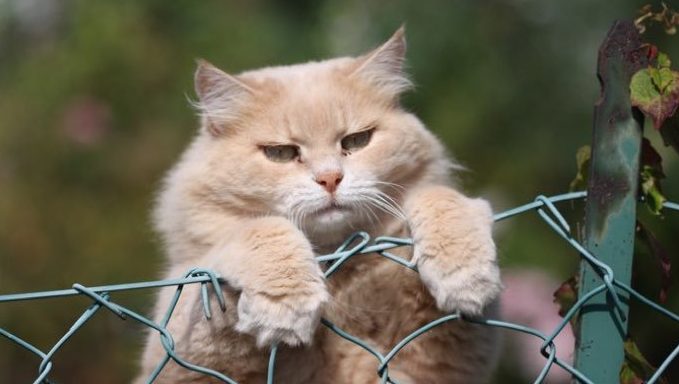
Canned food is far better for helping your cat lose weight than dry food. It has a higher percentage of protein than dry food and is 70 percent water, so it helps keep your cat from becoming dehydrated.
If you do feed your cat dry food, higher quality, high-protein foods are best. PetMD recommends dry food with at least 35 to 45 percent protein for best results.
Make sure the food does not have a grain listed as the first ingredient. If you’re switching your cat’s food, introduce it gradually by mixing the new food with the old food at first. This will help make sure your cat doesn’t get an upset stomach from the new food.
High protein food has an added bonus: it will keep your cat feeling fuller longer. But don’t neglect fiber completely, since it helps with digestion. All Feline Hospital recommends adding a tablespoon of canned pumpkin a day if you’re feeding your cat an all-meat diet.
Don’t Overfeed Your Cat
If a cat takes in more calories than they burn in a day, just like with a human, they will gain weight. Some cats love food too much and can’t handle free-feeding.
This can be especially true of a cat who used to live outside and is now an indoor cat. Those cats are used to getting more exercise and they’re also used to having to eat every bite of food they can find, in case food is tough to find later. Cats who used to be strays may have a tough time not overeating.
For most cats, depending on their size, a healthy weight is about seven to ten pounds. According to PetMD, a seven-pound-cat should eat about .6 to 1 ounce of food per meal. Coincidentally, this is about the same weight as a mouse!
All Feline Hospital adds that for maintenance, you should feed an indoor cat about 20 calories per pound each day. This means a ten-pound cat should get about 200 calories a day. To help with weight loss, reduce the number by no more than 20 calories a day.
If you’re not sure if your cat is overweight or how much food they should get in a day, talk with your vet.
Give Them Some Exercise
A healthy cat also gets plenty of exercise! You can encourage your cat to “work out” by having them chase food or toys up and down the stairs or using a feather wand or laser pointer for them to chase around the house.
If you have a solo cat, consider adopting a second cat. Cats that get along will play with each other, chase each other around the house, and increase their exercise substantially.
Remember, helping your cat reach a healthy weight will help them live a longer, happier life. Higher quality food may cost a little more, but you’ll end up saving money in the long run by avoiding future vet bills from health problems that obese cats face.
Have you ever helped your cat lose weight? What tips do you have? Let us know in the comments below!
Click the bold links in the article to shop for your cat and support our content!
